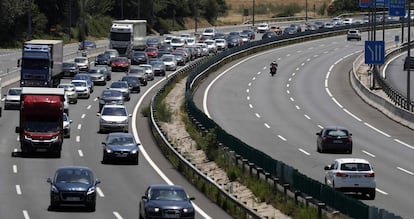Mind the pothole: investment in Spanish roads drops to 1980s levels
National, regional and local spending on new roads and maintenance is now around 0.4% of GDP, and the figure is likely to fall some more

Many drivers have a growing feeling that Spanish roads are getting bumpier, and there’s a good reason for it: nationwide investment in roads has dropped to around 0.4% of GDP, a level unheard of since 1986 – the last year with comparable data.
By 2013 government outlays on the Spanish road system had decreased to 0.45% of national output, and 2014 and 2015 were even worse. Compared with 2008 levels, central government spending on new roads decreased by 85% in 2015, while investment in road repairs fell by 59%.
Tenders down as well
Tenders are an early indicator of how much the government will spend on roads down the line. According to figures released by Seopan, the association of Spain's largest builders, tenders rose 6.7% in the first half of the year. But this figure is misleading, because it includes a series of tenders that were canceled by a court in 2015. If this amount is subtracted, the resulting amount shows a decline in tenders.
This investment includes all public outlays at the national, regional and local levels.
To cap it all off, in April of this year the Public Works ministry announced that it would be cutting a further €600 million in expenses, further reducing the amount earmarked for roads.
This means that investment levels will be at their lowest in three decades with regard to GDP, and the lowest in two decades in absolute terms, according to sources in road builder associations and the government.
The 2016 budget allocated around €1.77 billion for the Public Works ministry to invest in roads – €883 million for maintenance and a further €883 million for new roads. The State Society for Land Transportation Infrastructure (SEITT) added a further €439 million to that amount.
But in April of this year, financial authorities announced that ministries’ budgets would be scaled back to the tune of €2 billion, including €600 million in cuts to Public Works.
Sign up for our newsletter
EL PAÍS English Edition has launched a weekly newsletter. Sign up today to receive a selection of our best stories in your inbox every Saturday morning. For full details about how to subscribe, click
.
Most of this money will be taken away from roads for several reasons: first, to protect government investment in the railroad network and the European funds that come with it; and second, because the train system entails political commitments that the government does not want to break. And adjusting the road budget is viewed as an easier task than adjusting the railroad budget.
“It is powerfully striking how they’ve tried to protect the railroad system from the cuts. Investment in this field did not start to drop until 2013,” notes Matilde Mas, an economic analysis professor and researcher at IVIE, the Valencian Economic Research Institute.
High-placed government officials confirmed that local and regional authorities have reduced their spending on roads as much as possible.
It is obvious that the economic boom in Spain led to a glut of new roads, partly due to the promise of EU funds that favored new infrastructure. But the new network requires a minimum amount of maintenance that the OECD places at 2% of the cost of the infrastructure. This means that over a period of 50 years, authorities should spend just as much as they originally did on the original building work. This kind of maintenance work would prevent the need for new roads, leading to greater long-term savings, experts say.
But with Brussels now demanding further spending cuts in exchange for not slapping Spain with a fine over the budget deficit, expenditures on roads are likely to drop some more.
English version by Susana Urra.
Tu suscripción se está usando en otro dispositivo
¿Quieres añadir otro usuario a tu suscripción?
Si continúas leyendo en este dispositivo, no se podrá leer en el otro.
FlechaTu suscripción se está usando en otro dispositivo y solo puedes acceder a EL PAÍS desde un dispositivo a la vez.
Si quieres compartir tu cuenta, cambia tu suscripción a la modalidad Premium, así podrás añadir otro usuario. Cada uno accederá con su propia cuenta de email, lo que os permitirá personalizar vuestra experiencia en EL PAÍS.
¿Tienes una suscripción de empresa? Accede aquí para contratar más cuentas.
En el caso de no saber quién está usando tu cuenta, te recomendamos cambiar tu contraseña aquí.
Si decides continuar compartiendo tu cuenta, este mensaje se mostrará en tu dispositivo y en el de la otra persona que está usando tu cuenta de forma indefinida, afectando a tu experiencia de lectura. Puedes consultar aquí los términos y condiciones de la suscripción digital.









































